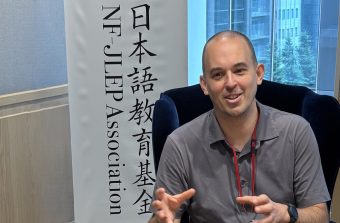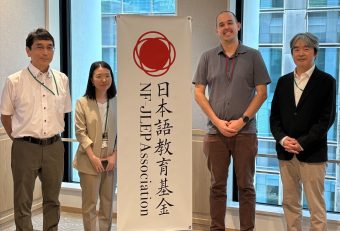(English follows Japanese)
 オーストラリアでは、多くの地域で中学2年生(14歳前後)から第二言語の学習が必修となっている。日本語はその主要な選択肢の一つであり、異文化理解や将来のキャリア形成に資するものとして一定の人気を保っている。しかし、中等教育修了後も日本語学習を継続する生徒は限られており、教育現場ではその継続率の低さが課題となっている。
オーストラリアでは、多くの地域で中学2年生(14歳前後)から第二言語の学習が必修となっている。日本語はその主要な選択肢の一つであり、異文化理解や将来のキャリア形成に資するものとして一定の人気を保っている。しかし、中等教育修了後も日本語学習を継続する生徒は限られており、教育現場ではその継続率の低さが課題となっている。
このような状況に対し、NF-JLEPの支援を受けてシドニーのマッコーリー大学が立ち上げたのがMirai: Futures with Japanプロジェクトである。本プロジェクトの牽引役であるベンジャミン・ギブ氏は、成果の報告のため2025年7月8日、NF-JLEP Association事務局(東京財団)を訪れた。氏は母国の高校で長年日本語を教えてきた経験を持ち、現在はニューカッスル大学教育学部の准講師として活躍している。
言語教育のジレンマと制度的制約
オーストラリアの公立校で外国語の授業は、通常一言語のみに限られており、日本語が唯一の選択肢である学校も少なくない。ただ、必修年以降の継続には最低20名の履修希望者が必要とされており、人数が満たなければ開講自体が見送られる。この制約は、教育現場にとって大きなジレンマとなっている。
言語学習は難易度が高く、指導が厳しすぎると生徒の意欲を削ぎかねない。一方で、一年間をアクティビティ中心の「楽しい授業」にするだけでは、翌年の学習段階で急激な難しさに直面し、生徒が挫折するリスクもある。ギブ氏は、こうしたバランスの難しさを現場で痛感してきた。
言語教育の優先度が低下している背景には、オーストラリア社会に根強い経済合理主義の影響があるという。教育は「より高い収入を得るための手段」として捉えられがちであり、企業も外国語スキルを積極的に評価しているわけではない。加えて、2030年にはアボリジニの言語教育がすべての公立校で必修化される予定であり、Auslan(オーストラリア手話)の人気も高まっている。こうした中で、日本語教育の存在感を維持することは容易ではない。
優秀な生徒ほど日本語を選ばないという逆説
ギブ氏が注目するのは、成績優秀な生徒ほど日本語を大学で専攻しないという逆説的な傾向である。オーストラリアでは大学がキャリアへの直結ルートと見なされており、リベラルアーツ的な学びは重視されにくい。そのため、日本語の試験で高得点を取る生徒ほど、医師や弁護士、エンジニアなどの専門職を志向し、日本語を学び続ける選択をしない。
こうした課題に対し、Miraiプロジェクトは、日本語や日本文化との関わり方は専攻に限らないことを伝えている。1〜2科目の履修や短期交換留学など、多様な関わり方を提示することで、生徒の選択肢を広げている。
2024年2月の対面イベントを皮切りに、同年7月にはオンラインイベント、2025年6月には再び対面イベントが開催された。これらのイベントにはオーストラリア全土から75校・450名の生徒が参加し、高校2年・3年での日本語学習継続にもつながっている。
若者の心を動かす「物語」の力
Miraiイベントでは、日本での体験を通じて人生が変わった若者たちのストーリーが共有される。友情や冒険、挑戦といったリアルな語りは、生徒たちの心を強く揺さぶる。ギブ氏は「今の若者は孤独を感じ、自分らしさを求めている」と語る。海外に行っても常に自国の友人とSNSなどを通じてつながっており、現地の人々との交流が希薄になっている現代において、こうしたストーリーは大きな意味を持つ。
また、スキー場での就労や大学サークルへの参加など、日本を訪れる具体的な方法も紹介されており、保護者や地域社会からは得にくい情報が提供されている。失敗や恥ずかしい経験も含めて、人として成長し、自信を得ることの重要性が強調されている。
教育者としての原点と信念
ギブ氏自身、日本語の成績は決して優秀ではなかったと振り返る。素晴らしい教師と仲間に恵まれ、ワーキングホリデーで訪れた日本でその魅力に引き込まれた。上智大学での交換留学では、和敬塾という寮の厳格な上下関係の中で多くを学び、日本語力を飛躍的に伸ばした経験が、教育者としての原点となっている。
現在はニューサウスウェールズ州で日本語教師として活躍し、州内で最も広く使用されている教科書の著者でもある。言語教育においては、「間違いを指摘することが、生徒に『不十分だ』というメッセージとして伝わってしまうことがある」とし、Miraiプロジェクトでは「楽しむこと」を重視している。
イベントでは常にこう伝えているという。「試験の結果は気にしなくていい。日本が好きなら、まず行ってみよう。きっと素晴らしい体験ができるから」と。
ギブ氏の教育への情熱と日本語教育への献身は、多くの生徒や教育関係者に大きな影響を与えている。東京財団は氏の訪問に深く感謝の意を表し、今後も優れた教育者やNF-JLEP関係者と連携し、日本語教育の未来をともに拓いていくことを志す。(文責:河本 望)
The Art of Motivating Language Learners and Building Robust “Futures with Japan”

NF-JLEP fellowships are tailored to meet the specific needs and circumstances of Japanese-language education in each country. In most parts of Australia, learning a second language becomes compulsory in Year 8, when students are typically around 14 years old. This exposure is aimed at enhancing communication skills, deepening cultural understanding, and broadening career options.
Motivating students to continue studying Japanese beyond high school, though, remains a challenge, says Benjamin Gibb, leader of the “Mirai: Futures with Japan” project at Macquarie University, funded by NF-JLEP.
Gibb, a long-time teacher practitioner in Australian high schools and associate lecturer at the University of Newcastle’s School of Education, visited the NF-JLEP Association secretariat on July 8 to share insights from the project. He noted that many students attending Mirai events in 2024 and 2025 were uncertain about continuing their Japanese studies.
In most public schools in Australia, only one foreign language is offered, Gibb explains. “If that language is Japanese, there’s no French or Spanish, and all student at the school take that course. To continue for a few more years, there must be at least twenty students choosing that language. If not, there’s no class.”
This creates a dilemma for educators. “If you’re too strict, students won’t continue. Language learning is one of the most challenging things you can do,” Gibb says. “And unfortunately, Australians don’t value language learning as much as we used to.”
Making lessons too easy can present its own problems. “Some teachers might spend a year doing fun activities like origami, but when students move up a level, they suddenly find the coursework much more difficult.”
The low priority given to language learning reflects broader economic realities. While Japanese remains popular, Gibb notes, “Employers aren’t actively looking for foreign language skills. Australia is a country driven by economic rationalism, and education is seen as something that can get you a better pay.”
Another emerging challenge is the growing emphasis on Aboriginal languages, which will become mandatory in all public schools in 2030. “Auslan (Australian Sign Language) is also gaining popularity. If school principals don’t value second languages, they may opt for sign language instead.”
The Top Learner Paradox
Gibb observes a paradox in student choices. Most Australian families see university as a direct route to a career, not as a chance for broad, liberal arts education. “The best students in Japanese, who’re scoring 95-plus on exams, are often aiming to become doctors, lawyers, or engineers. They’re not choosing degrees in Japanese.”
The Mirai project was designed to address this gap by showing students how they can engage with Japanese language and culture without committing to a full degree. “We explain that they can take one or two Japanese courses or go on a semester exchange.”
The project has had a significant impact, leading to strong improvement in Japanese study motivation for students. Launched in February 2024 with an in-person event, Mirai held an online follow-up in July and another face-to-face gathering in June 2025. These events drew 450 students from 75 schools across Australia, helping sustain Japanese classes in Years 11 and 12.
“I think a lot of young people today feel lonely and are eager to find their own identity,” Gibb reflects. “Even when traveling in another country, they stay connected online with their friends back home. They’ll use QR codes to check into hotels, rely on Google Maps to get around, and visit pre-researched restaurants. But there’s no human connection. They’re not staying in backpacker hostels and meeting new people like before.”
Sharing Life-Changing Stories
The Mirai events emphasize storytelling from young people who’ve had transformative experiences in Japan. “When you get hundreds of kids who love Japanese into a big theatre, and they hear stories about friendships and wonderful adventures, you can see their eyes light up. It’s incredibly motivating for them.”
Students also learn about opportunities to visit Japan. “They don’t know they can work at a ski resort on a holiday visa or join a university club during a semester exchange. The kids aren’t getting that information from their parents or the wider community, so they need to be told that. We emphasize that through these experiences—including failures and embarrassments—they can grow as a person and gain new confidence.”
That, Gibb believes, is the essence of becoming a global citizen. “It’s not about visiting the best places or eating the best food. Cosmopolitanism is about interacting with people from different cultures, understanding how to be respectful, and seeing everyone as your sister or brother.”
Freedom to Be Yourself
Gibb admits that he himself was not among the top students in Japanese. “I was actually at the very bottom, but I felt a connection to the language. I had a great teacher and really enjoyed being with my classmates. I went on a working holiday to Japan, and it was such a great adventure that I got hooked.”
Living abroad, he says, can be liberating. “I didn’t quite fit in where I grew up, but moving overseas let me reinvent myself. I originally planned to become a high school English teacher, but I developed a deep passion for Japan.”
His exchange year at Sophia University in Tokyo was transformative. “I had a really immersive experience. I was at university only to attend class. Most of the time, I was in this amazing community at Wakeijuku, the dormitory where I lived. It was very traditional and hierarchical, but I was hanging out there all the time.”
Most other international students at Sophia lived in an “English bubble,” Gibb notes. “Japanese students want to speak English with you, which can be frustrating if you’re trying to learn Japanese. They could see that my Japanese was going up and up, and that’s when I realized how important it is to proactively meet people and build friendships.”
Now a senior Japanese teacher in New South Wales, Gibb also authors the state’s most widely used textbooks. “When students are learning a language, we’re always correcting them with a red pen. The tacit message we’re giving them is, ‘You’re not good enough,’ and this can become very discouraging.”
Instead, Gibb encourages students to focus on the joy of learning. “At Mirai, I always tell the participants: don’t worry about the exam. If you love Japan, just go there. You’ll have a great time!”
The NF-JLEP Association secretariat extends its heartfelt thanks to Gibb for his inspiring visit. His passion for teaching and dedication to Japanese-language education are truly infectious. We look forward to continuing our collaboration with outstanding educators like him and with all NF-JLEP institutions to further enrich and expand programs that foster both the learning and teaching of Japanese. (Compiled by Nozomu Kawamoto)
